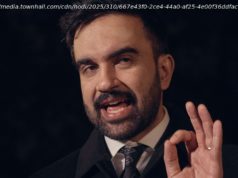 TEL AVIV, Israel — An Israeli soldier was convicted of manslaughter Wednesday in the deadly shooting of a badly wounded Palestinian attacker, capping a nine-month saga that has deeply divided the country.
TEL AVIV, Israel — An Israeli soldier was convicted of manslaughter Wednesday in the deadly shooting of a badly wounded Palestinian attacker, capping a nine-month saga that has deeply divided the country.
The verdict, which marks an extremely rare case of an Israeli military court convicting a soldier for lethal action taken in the field, threatened to deepen the rift. Military commanders have condemned the soldier’s conduct while much of the public, along with leading members of the nationalist ruling coalition, have rallied behind him.
With Sgt. Elor Azaria’s sentencing believed to be weeks away, the country now faces a heated debate over whether he deserves clemency. Within minutes of the verdict, leading politicians were already calling for him to be pardoned. Under Israeli law, the country’s largely ceremonial president has the authority to issue a pardon.
Sgt. Azaria, an army medic, was caught on video in March fatally shooting a wounded Palestinian attacker who had stabbed a soldier in the West Bank city of Hebron. The Palestinian, Abdel Fattah al-Sharif, was lying on the ground and already unarmed when Sgt. Azaria shot him in the head.
In delivering the verdict, which lasted nearly three hours, Col. Maya Heller, head of a three-judge panel, rejected Sgt. Azaria’s defense in painstaking detail.
She said there was no evidence to support his contradictory claims that the attacker was already dead or that he posed any threat at the time, telling him he “couldn’t have both sides of the stick.” She called his testimony “unreliable” and said he “needlessly” shot the assailant.
“We found there was no room to accept his arguments,” she said. “His motive for shooting was that he felt the terrorist deserved to die.”
Sgt. Azaria faces a maximum penalty of 20 years behind bars, though he is not expected to receive that much time. The military said he would be sentenced Jan. 15. The defense team said it would appeal.
The 20-year-old Sgt. Azaria entered the court smiling and appearing confident, and he was embraced by a few dozen relatives and friends. But as the verdict was delivered, he stared gloomily ahead, and tensions quickly boiled over in the cramped, crowded courtroom.
Members of Sgt. Azaria’s family clapped sarcastically as the decision was delivered, some screaming “Our hero!” A female relative was kicked out of the courtroom for screaming at the judges, and a second woman stormed out, shouting, “Disgusting leftists.”
After the judges walked out, Sgt. Azaria’s mother, Oshra, screamed, “You should be ashamed of yourselves.” Sgt. Azaria tried to comfort her and calm her as she wailed. Another family member whipped his jacket at a female reporter, missing his target and instead hitting another relative.
Hundreds of the soldier’s supporters, many of them young religious men wearing skullcaps, gathered outside the military court in Tel Aviv ahead of the verdict. The crowd, holding large Israeli flags and banners, periodically scuffled with police.
Some demonstrators chanted veiled death threats against the Israeli army’s chief, Lt. Gen. Gadi Eizenkot, insinuating he would face the same fate of slain Israeli Prime Minister Yitzhak Rabin, assassinated 20 years ago by an ultranationalist Israeli.
“Gadi, Gadi, watch out. Rabin is looking for a friend,” the demonstrators chanted. The crowd was quickly dispersed without any further violence.
With the 50th anniversary of Israel’s occupation of the West Bank approaching, the highly charged trial had fueled a debate about military ethics and the place of the army in Israeli society. The shooting occurred at the height of what has become more than a yearlong wave of Israeli-Palestinian violence.
Sgt. Azaria’s defenders said he shot the assailant in self-defense and accused the army of abandoning a soldier on the battlefield, and hard-line politicians have said he should be either cleared or released with a light penalty. But his detractors, including senior military commanders, have said his actions violated the army’s code of ethics and procedures.
The uproar has put the army, the country’s most respected institution, in a delicate position. Military service is compulsory for Israel’s Jewish majority, and there is widespread sympathy for soldiers, since virtually every family has a member who is serving or has served in the past.
Prime Minister Benjamin Netanyahu, who initially defended the military’s handling of the case, later softened his position and called Sgt. Azaria’s parents to console them and urged Sgt. Azaria be pardoned immediately.
“Today, a soldier who killed a terrorist who deserved to die and who had tried to slaughter a soldier was put in handcuffs and convicted like a criminal,” said Education Minister Naftali Bennett, head of the pro-settler Jewish Home Party, who wants to unilaterally annex the 60 percent of the West Bank where Israeli settlements are mostly clustered.
The dispute helped fuel the resignation of Defense Minister Moshe Yaalon, who sided with the military, earlier this year. His successor, Avigdor Lieberman, visited Sgt. Azaria in court.
Mr. Lieberman, who heads a hard-line nationalist party, said he disagreed with the “difficult” verdict but urged the public to respect the court’s decision. He said the defense establishment would do “everything it can” to help Sgt. Azaria and his family.
“We must keep the army outside every political argument … and keep it in the widest consensus in Israeli society,” he said.
Miri Regev, a popular Cabinet minister from Mr. Netanyahu’s Likud Party and a former military spokeswoman, and Shelly Yacimovich, a leading opposition lawmaker, also called for him to be released.
President Reuven Rivlin’s office said a pardon request would be weighed only “following a conclusive judicial ruling.” With Sgt. Azaria still facing sentencing and an appeals process, that means the matter may not come before the president for some time.
The statement gave no indication whether Mr. Rivlin would support a pardon, saying only that he would consider a request “in accordance with standard practices and after recommendations from the relevant authorities.”
Israeli rights groups have accused the army of failing to prosecute soldiers who commit unnecessary violence against Palestinians, and trying a soldier for a crime as serious as manslaughter is virtually unheard of. According to the army, the only manslaughter conviction “in recent years” came in 2004 over the fatal shooting of a pro-Palestinian British activist.
It is rare for a military court to rule against a soldier over lethal action taken in the field, not only in Israel but also elsewhere in the world.
Start
United States
USA — mix Israeli soldier convicted in death of badly wounded Palestinian assailant






